
リーズナブルな価格で配当の成長を求めているなら、始めるのに最適な場所の1つは配当貴族です。
ごめん。 それらを意味するのではありません 配当貴族。池の向こう側にいる隣人、つまりヨーロッパ配当貴族を意味します。
European Dividend Aristocratsは、その名前が示すように、安定した成長を続ける支払いで認められたヨーロッパの配当株の集まりです。また、S&P Europe 350インデックスのこのサブセットは、米国のインデックスよりもはるかに目立つ傾向があります。これは、一貫して上昇する配当がヨーロッパ全体ではるかに珍しいためです。
もちろん違いはあります。 S&P 500配当貴族は、最低25回の連続した年間配当の増加を提供する必要があります。対照的に、欧州配当貴族は10年間の安定または増加を示すだけで済みます。 配当。
2020年までの10年間で、欧州配当貴族は年率12.5%の総収益を生み出しました。これは、ベンチマークのユーロ圏指数からの10%の収益、および米国の貴族の13.5%の収益と比較してかなりのパフォーマンスです。しかし、もっと重要なことは、価値を求める人にとって、ヨーロッパの配当貴族は現在16未満の平均P / Eで取引されているのに対し、米国の貴族は19を超えています。
39のヨーロッパ配当貴族すべてを探索するために読んでください。 以下の国際配当株のいずれかへの投資を検討している場合、ここにあるすべての株は米国上場株を持っていますが、すべてがまったく同じではないことに注意してください。米国の主要取引所に上場しているところもあります。他のものは「店頭」で取引されていますが、それでも1日の出来高が高いため、見積もり価格に近い価格で売買する可能性があります。しかし、OTC株を非常に薄く取引しているものもあります。それらを購入する場合は、指値注文を使用して、実際に希望する価格で取引できるようにします。

ベルギーの UCB (UCBJF、$ 96.43)は、神経疾患および免疫疾患の治療を専門とするバイオ医薬品会社です。 UCBの最も有名な薬には、Cimzia(自己免疫疾患および炎症性疾患)、Vimpat、KeppraおよびBriviact(てんかん)、およびNeupro(パーキンソン病)が含まれます。開発後期の薬剤には、ビメキズマブ(乾癬)、ダピロリズマブペゴルおよびスタッカートアルプラゾラム(てんかん発作)が含まれます。
同社は買収を通じてパイプラインを拡大しています。 2020年には、RaPharmaとEngageTherapeuticsの購入を終了しました。 Ra Pharmaは重症筋無力症の治療におけるUCBのリーダーシップを拡大し、Engageは新しいてんかん薬を提供します。
UCBの医薬品ポートフォリオの好業績により、2021年の売上高は9%増加し、コアEPSは3%増加しました。同社は、中間点で前年比12.5%増の5.60ユーロから6.10ユーロの範囲の2021EPSを目指しています。
同社は、2022年にVimpat、2024年にCimzia、2026年にBriviactのピーク売上に達すると予想しています。新薬の売上を拡大することで、全体的な売上成長に十分な道が開かれます。
UCBは、最新の欧州配当貴族の1つです。 2006年から配当を支払い、2010年から着実に配当を増やしており、2020年には2.5%の増配があります。

ジボダン (GVDNY、79.15ドル)は、フレグランス、パーソナルケア製品、香料、飲料、食品のスイスの製造業者および販売業者です。ファインフレグランスで市場トップシェアを誇っています。
同社は約122,600の異なる製品を販売しており、世界中の69の研究センターで進行中のR&Dによる製品ラインの拡大に引き続き注力しています。ジボダンはすでに3,600件の有効な特許を保有しています。世界中で販売されています。同社は、先進国での売上の58%、新興市場での売上の42%を生み出しています。
パンデミックにもかかわらず、ジボダンは2020年の好業績を達成し、売上高は4%増加し、EBITDAは10%増加しました。フリーキャッシュフローの創出は売上高の12.8%と優れていました。過去5年間で、同社は年間売上高の5%近くの成長と、売上高の平均12.6%のフリーキャッシュフローを生み出しました。
ジボダンは、製品ポートフォリオを栄養、食品原料、美容などの新しい分野に拡大し、中国での市場リーダーシップを活用することで、年間4%から5%のオーガニック売上高の成長を目標としています。
ジボダンの配当は2009年以降毎年増加しており、過去5年間で年間3.5%を超えています。これには、2020年の3.2%の改善が含まれます。優れたフリーキャッシュフローの生成により、ジボダンは収益からの比較的高い80%の支払いに満足しています。

スイスRE (SSREY、$ 25.22)は 再保険および保険の世界的な大手卸売業者。同社は、保険会社、中規模から大規模の企業、政府機関など、世界中の約2,300のクライアントに直接およびブローカーを通じて販売しています。世界中の80のオフィスを通じて運営されており、損害保険、生命保険、健康保険、および法人顧客向けの混合ソリューションを販売しています。
スイス・リーは、不動産および損害保険セグメントにおいて、低金利を補うために引受マージンの拡大に取り組んでいます。同社は2021年に96%のコンバインドレシオを目標としています。ライフ&ヘルス事業では、特にアジアで新規事業を創出し、将来の収益成長の基盤を築くことに重点を置いています。同社の新しいデジタル保険プラットフォームであるiptiQは、この取り組みに貢献しています。 IptiQは、すでに40の販売パートナー、50万人の顧客、3億ドルを超える総保険料を確保しています。
COVIDの影響により、スイスREは2020年に純損失を記録しましたが、同社は9月四半期の時点で収益性の高い成長に戻り始めました。 Swiss Reは、通年で8億7800万ドルの損失を報告しました。 COVID-19関連の請求と準備金を取り消すと、純利益は22億ドルで、2019年の7億2700万ドルを大幅に上回りました。そして9月の四半期に、同社は事業売却を完了し、スイス・リーに15億ドルの配当金を支払いました。
この欧州配当貴族は1994年以来年間配当を支払い、2019年に12%増加した後、2020年に5%の配当を支えてきました。

パートナーグループ (PGPHF、$ 1,365.00)は、スイスのプライベートエクイティ会社であり、約900の機関投資家にサービスを提供し、約1,900億ドルの資産を管理しています。同社は、さまざまな地域や業界の民間債務、不動産、インフラストラクチャ、および株式に投資しています。主に非周期的な産業、ヘルスケア、製薬のアウトソーシングビジネスに投資しています。
プライベートエクイティ投資家として、PartnersGroupはグローバルバイアウトマネージャーのトップティアにランクされています。
同社の運用資産は、2006年の新規株式公開(IPO)以来毎年増加しています。 2020年の間に、パートナーグループの運用資産は11%増加し、160億ドルの新規顧客資金が会社に流入しました。同社は、2021年の流入が160億ドルから200億ドルの範囲になると予想しており、COVID関連の不確実性が徐々に緩和されてプライベートエクイティ市場の需要が高まると予想しています。
パートナーグループは、2020年に収益が12%減少したと報告しました。これは主に、COVID-19の影響を大きく受けた成功報酬の急落によるものですが、管理報酬は実際には1%改善しました。総じて、同社は約11%の利益の減少を維持しました。
パートナーグループの配当は2008年以降毎年増加しており、過去10年間の成長率は毎年20%を超えています。

Experian (EXPGY、$ 35.03)は、消費者信用を専門とするアイルランド系アメリカ人の企業です。同社は、約2億2,000万人の米国の消費者と4,000万人の米国企業の信用情報を保持しています。 Experianは、収益の63%を北米から、15%を英国とアイルランドから、14%をラテンアメリカから、8%をアジア太平洋から得ています。
同社は貸し手と消費者のための信用情報源として設立されましたが、その後、通信、政府機関、自動車販売店、病院、その他の業界を含むように顧客基盤を拡大してきました。
Experianは2020年度に売上高を9%、EBITを5%増加させ、パンデミックにもかかわらず2021年度には順調なスタートを切っています。収益はガイダンスを上回り、12月四半期には9%増加しました。これは、同社の北米およびアジア事業からの貢献によるものです。経営陣は2021年のEBIT(金利税引前利益)を13.5億ドルから13.8億ドルの範囲で予測しており、昨年の13.9億ドルのEBITとほぼ横ばいです。
Experianは、2020年に配当を1%引き上げました。今年は、昨年支払われた中間配当と一致する15セントの中間配当を2021年2月に発表しました。

ヘキサゴンAB (HXGBY、95.54ドル)は、地理空間マッピングおよび産業用アプリケーション向けのハイテクツールを提供します。
サービスは2つのセグメントにわたって提供されます。インダストリアルエンタープライズソリューショングループは、コンピューター支援設計、製造、エンジニアリングに必要な正確な測定を提供するシステムを構築しています。 Geospatial Enterprise Solutionsセグメントは、陸と空からデータをキャプチャし、衛星を配置し、3Dマップとモデルを生成するシステムを構築します。同社はスウェーデンに本社を置き、160か国の顧客にサービスを提供しています。
測量はHexagonの最大の事業であり、売上の約20%を占めています。
ヘキサゴンの売上高と収益は2020年に減少しましたが、同社は12月四半期の記録的な収益を達成し、キャッシュフローを改善しました。中国と地理空間サービスは、四半期の主要な成長ドライバーであり、それぞれ25%と7%の有機的成長をもたらしました。ヘキサゴンは、2021年に正規化されたレベルに戻るために、その産業セグメントからの需要を探しています。
同社は2020年に配当を5%増やし、7対1の株式分割も提案しました。ヘキサゴンは、5年間で年間14%近くの配当成長を達成しました。

フランスのエルメスインターナショナル (HESAY、$ 113.18)は、45か国にまたがる311のブティック店のネットワークを通じて販売されている、高級アクセサリーと皮革製品の大手サプライヤーです。 180年以上前にサドルメーカーとして設立されたHermès Internationalは、ヨーロッパ、アジア、米国で売り上げの大部分を生み出す最高の高級ブランドに進化しました。
COVID関連の封鎖によって2020年までの困難な始まりの後、エルメス インターナショナルは9月四半期に成長に戻り、グループの店舗での強い顧客トラフィック、アジアでの勢い、ヨーロッパと米国での全般的な状況の改善の結果、売上高は7%増加しました。通年では、収益は6%減少しました。
投資調査会社UBSは最近、エルメスなどの高級ブランドが中国での市場シェアを拡大しており、HESAYを高級品セクターのトップピックにランク付けしていることを顧客に伝えました。
同社は昨年、COVIDにより、1株当たり4.55ユーロの配当を安定的に維持しました。過去には、配当の伸びは年間平均11%近くでした。他のいくつかのヨーロッパ配当貴族のように、エルメス また、時折特別配当を支払うこともあります。
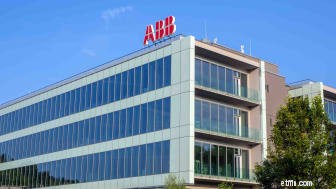
ABB (ABB、31.21ドル)は、電化、産業自動化、モーション、ロボット工学のアプリケーションで使用される機器を製造し、公益事業、産業、輸送、インフラストラクチャ業界の顧客にサービスを提供しています。このスイスの会社は、電気自動車の充電ステーション、太陽光発電の暖房、自動配電、その他のハイテクアプリケーションにインフラストラクチャを提供しています。
ABBは、ほとんどの市場で1、2、または3の市場シェアを保持しており、シーメンス(SIEGY)、エマソンエレクトリック(EMR)、ハネウェル(HON)、ロックウェルオートメーション(韓国)、ゼネラルエレクトリック(GE)を長年にわたって数えています。常連客。
ABBの長期的な成長を後押しするトレンドには、電力需要が他のエネルギー源の2倍の速さで上昇すること、自動化の増加、人工知能の製造アプリケーションなどがあります。
ABBは、COVID関連の産業停止により、2020年に6%の収益減少に見舞われましたが、同社のPower Grids事業での53億ドルの売却益により、基本的なEPSは261%増加しました。 ABBは、売却による76億ドルの現金収入を、新しい43億ドルの自社株買いプログラムを含めて投資家に還元する予定です。
今年、ABBは事業運営を完全に分散化することを計画しており、これにより年間5億ドルのコスト削減が見込まれます。
会社は年間配当を支払います。支払いは毎年増加していませんが、配当は14年間で3倍以上になっています。

英国を拠点とする Ashtead Group (ASHTY、249.75ドル)は、主にSunbelt Rentalsのモニカの下で、米国、英国、カナダに拠点を置くグローバルな機器レンタル事業を運営しています。同社は、建設、ユーティリティ、インフラストラクチャ、エンターテインメント、緊急対応の各ビジネスで、世界中の745,000を超える顧客にさまざまなツールや産業機器を貸し出しています。
そのSunbeltU.S。事業は、北米で2番目に大きな機器会社です。 840店舗を運営し、総収益の86%を占めています。 Sunbeltはまた、カナダで75の場所を持ち、4%の市場シェアを持っています。
同社の英国事業は、その国で最大の機器レンタル会社であり、193店舗を運営し、総収益の9%を占めています。
6月に終了した2020会計年度中、アシュテッドグループの売上高は9%増加しました。これは、米国で10%の成長、カナダで22%の成長に支えられています。同社は昨年、105の新規店舗をオープンしました。これにより、EPSがわずかに増加し、フリーキャッシュフローが倍増して過去最高の7億9,200万ポンドになりました。
COVIDは2021年上半期の業績を抑制しましたが、アシュテッドグループは記録的なフリーキャッシュフローを生み出すことができ、将来の配当成長の前兆となりました。さらに、同社は財務レバレッジをEBITDA(利息、税金、減価償却および償却前の収益)のわずか1.7倍に減らし、3つの新しい店舗をオープンすることでグリーンフィールドの拡大を再開しました。
Ashtead Groupは、2019年に21%の大幅な引き上げを行った後、2020年に配当を2%引き上げました。支払いは半年ごとに行われます。
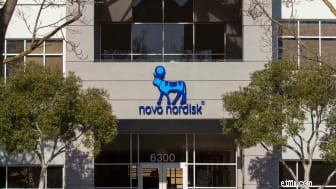
デンマークのノボノルディスク (NVO、$ 67.89)は糖尿病と肥満の治療を専門とし、血友病と成長ホルモン関連障害の薬も開発しています。同社は、ブラジル、中国、デンマーク、フランス、米国の製造拠点から世界のインスリンのほぼ半分を供給しています。
ノボノルディスクには、巨大なアドレス可能な市場があります。世界中で、4億6300万人が糖尿病を患っており、6億5000万人が肥満に苦しんでおり、45万人が血友病に苦しんでいます。
今後5年間の同社の戦略目標には、糖尿病市場でのシェアを3分の1に引き上げ、肥満市場での売上を2倍にすることが含まれます。ノボノルディスクは、2020年に糖尿病の売上高を8%増加させ、糖尿病の市場シェアを29%に増加させました。昨年、全体の売上高は4%増加し、EPSは10%増加し、配当は7%増加しました。ノボノルディスクは、2021年に5%から9%の売上成長、4%から8%の利益成長を目指しています。
12月四半期の研究開発のハイライトには、週1回の糖尿病治療薬であるセマグルチドのFDA提出が含まれます。欧州連合が週1回の体重管理治療薬を申請しています。アルツハイマー病治療薬の後期臨床試験の開始。同社はまた、Emisphereの購入を通じて独自のドラッグデリバリー技術を取得しました。
糖尿病は慢性疾患であるため、ノボノルディスクのインスリン販売は、同社の強力な研究開発投資と配当金の増加をサポートする堅調な経常キャッシュフローを生み出します。
ノボノルディスクは半年ごとに配当を支払います。過去5年間で、この欧州配当貴族は、年間12%の健全な年間配当で総配当を伸ばしました。

英国の M&G (MGPUF、$ 3.03)は最近、プルデンシャル(PUK)からスピンオフされ、世界をリードする資産運用会社の1つに位置付けられ、世界中の500万を超える個人顧客と800の機関投資家にサービスを提供しています。
英国とヨーロッパでは、M&Gは、ボラティリティを最小限に抑えて長期的な成長を目指すファンドのファミリーであるPruFundを含む、さまざまな長期的な貯蓄および投資商品を提供しています。南北アメリカ、アフリカ、アジア、オーストラリアでは、同社は直接的な資産管理サービスを提供しています。
M&Gは、資産の所有者と管理者の両方であり、クライアントと一緒に投資し、他よりも迅速に資本を展開するという点で珍しいです。 M&Gは、ヨーロッパ最大の資産運用会社の1つであるだけでなく、英国最大の債券スペシャリストの1つであり、民間資産の世界的な大手管理者でもあります。
同社は、世界人口の高齢化やヨーロッパの投資家が保有する10兆ユーロを超える投資可能な現金などの世界的なトレンドから恩恵を受けています。
Prudentialの一環として、M&Gは15年間の増配を実現しました。 2019年、同社は1株当たり11.92ペンスの普通配当と3.85ペンスの特別分割配当を支払いました。同社は2020年の中間配当として8月に6.0ペンスを支払い、2021年4月に12.23ペンスの最終配当を支払う予定です。

エナガス (ENGGY、$ 11.10)は、スペインを代表する天然ガス販売業者であり、11,000キロメートルのガスパイプライン、3つの地下貯蔵施設、4つの再ガス化プラントを介してサービスを提供しています。さらに、エナガスはメキシコの再ガス化プラントと南米の主要なガスパイプラインおよびコンプレッサーステーションの株式を保有しています。同社はまた、チリのLNGターミナルとペルーのガス輸送事業にも投資しています。
エナガスの最大のエクイティパートナーシップは、カスピ海からヨーロッパにガスを運ぶトランスアドリアティックパイプライン(TAP)の建設です。ほぼ5年間の建設の後、2020年11月にトランスアドリアティックパイプラインの商業運転が開始されました。これにより、エンガスの2021年の収益と収益が大幅に増加するはずです。
同社はまた、ギリシャのガス事業者DESFAと、11,000キロメートルのガス輸送パイプラインを所有する米国企業であるTallgrassEnergyへの投資家でもあります。
2020年には、天然ガスと電力の需要の減少がエナガスの売上から約6%減少しましたが、適切な経費管理と有利な為替レートにより、純利益は5%増加しました。同社は公益事業のバランスシートがしっかりしており、フィッチとスタンダード&プアーズの両方からのBBB +の債券格付けがあり、2022年までに重要な債務の満期はありません。
エナガスは2020年に配当を3%近く引き上げ、適度な特別配当も支払いました。

ベルギーの持ち株会社 Groupe Bruxelles Lambert (GBLBY、$ 10.54)は、ヨーロッパ最大の投資会社の1つです。アディダス(ADDYY)やペルノリカール(PRDDF)などの業界をリードする企業にかなりの株式を保有しています。 2番目の事業であるSiennaGroupは、主要なファンドマネージャー全体に投資しています。同社の投資ポートフォリオの全体的な価値は、2020年に189億ユーロを超えました。
2020年の最初の9か月間、ポートフォリオ企業からの収益の減少により、GBLの純資産価値が減少し、現金収益が29%減少しました。それにもかかわらず、同社の財政状態は堅調に推移している。 GBLは、S&PとムーディーズからそれぞれA +とA1の信用格付けを取得しており、ヨーロッパで最も格付けの高い投資運用会社の1つです。
同社は投資のために十分な現金を持っており、最近、ドイツの高級自転車と電動自転車の大手メーカーであるキャニオンの過半数の株式を取得しました。キャニオンは年間25%以上の売り上げを伸ばしています。
過去15年間で、同社は年間4.6%の配当を引き上げ、株主に59億ユーロを還元してきました
。
イギリスの Intertek Group (IKTSY、82.32ドル)は、100か国以上にまたがる1,000以上のラボのネットワークを通じて、製品テスト、品質保証、および認証サービスを提供しています。同社は世界最大の消費財テスターであり、建設、ヘルスケア、食品製造、輸送業界の顧客にサービスを提供しています。
Intertek Groupは、2002年のIPO以来、年間売上高が10%増加し、EPSが11%増加するという、一貫した成長の印象的な実績があります。同じ期間に、配当は年率16%で拡大しました。これは、FTSE100企業の中で最も高い配当成長率です。
COVIDの影響により、Intertekは2020年に恒常通貨ベースで6.7%の収益減少を報告しました。調整後の収益は18.1%と大幅に減少しました。
しかし、Intertek Groupは、世界のCOVID後の安全性と持続可能性への焦点、規制の強化、人口増加により、成長の機会が増えると見ています。
過去10年間の同社の配当の伸びは、年間平均13%近くに上ります。 Intertek Groupは、2019年に沿った105.8ペンスの年間配当を支払いました。

175年以上前に設立された、スイスのチョコレートメーカー Lindt&Sprungli (LDSVF、$ 8,597.15)は、プレミアムチョコレートの世界的リーダーです。同社は、Lindt、Hofbauer、Kufferle、Ghiradelli、Whitman's、RussellStoverの各ブランドで製品を販売しています。年間8000万人以上の訪問者にサービスを提供する世界中の500の会社所有のショップや、その他の小売およびeコマースチャネルを通じて販売が行われています。
世界最大のチョコレート市場である米国では、リントはプレミアムチョコレートセグメントで第1位の市場シェアを持ち、チョコレート全体の売上高で第3位です。同社は、計画された量の増加をサポートするために米国の生産施設を拡張し、米国の顧客にサービスを提供するロジスティクスネットワークをアップグレードしています。
Lindt&Sprungliは、COVID関連の一時的な店舗の閉鎖の結果として、2020年に5〜7%の売上減少を目指していますが、2021年には年間5%の本源的売上成長とEBITマージンの改善を目標としています。
欧州配当貴族の配当は2020年に5%増加し、Lindt&Sprungliも適度な特別配当を支払いました。過去10年間の配当の伸びは、平均して年間約7%です。

英国の Croda International (COIHY、45.19ドル)は、パーソナルケア製品だけでなく、ライフサイエンス、パフォーマンステクノロジー、および産業用アプリケーションで使用される高性能の特殊化学品を製造しています。同社は38か国で事業を展開し、17,000を超える顧客にサービスを提供しています。新しい特許または保護された製品は、Crodaの年間売上の約30%を占めています。
Crodaは、食材の透明性を高めるという消費者の需要に対応する新しいパーソナルケア製品と、食品生産を促進するライフサイエンス製品を開発しています。さらに、同社はファイザーがCOVIDワクチンに使用する添加剤を供給しています。
Crodaの通年売上高は、2020年の最初の6か月は困難でしたが、実際には恒常通貨ベースで1.1%改善しました。フリーキャッシュフローは12.3%減少しました。
Croda Internationalは、2001年以降、毎年配当を増やしています。配当は半年ごとに支払われ、会社は特別配当を支払うこともあります。 Crodaは、配当を約55%に維持しながら、2020年に配当をわずかに引き上げました。

ダブリンを拠点とする DCC (DCCPF、81.89ドル)は、米国、ヨーロッパ、アジアで大規模なLPG(液化石油ガス)の販売およびマーケティング事業を運営しており、天然ガスおよび電力の小売販売で発展途上の事業を行っています。 The company also deals in commercial fuels and heating oil and has profitable healthcare and technology businesses. DCC is a member of the FTSE 100 and has annual revenues exceeding £14.8 billion.
In its LPG operations, DCC has established a stable platform for further growth in Germany, Asia and the U.S. while venturing into adjacent fuel markets like natural gas and electricity that leverage its infrastructure and globally recognized brands.
DCC has delivered 14.5% annual growth in operating profits and 14% dividend growth over 26 years. During the six months ended in September, DCC's operating profits rose nearly 9%, fueled by strong contributions from its healthcare business. It has not yet released its full-year results.
DCC has paid a rising dividend every year since 2004. Dividends are paid semi-annually and rose 5% in fiscal 2020.
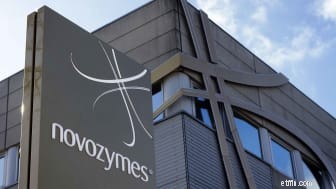
Danish Novozymes (NVZMY, $62.84) develops industrial enzymes and micro-organisms used in crop production, animal health, food and beverages and cleaning solutions. The company estimate 5.6 billion people worldwide use products containing Novozymes enzymes on a weekly basis.
Novozymes' sales were flat in 2020 and EPS declined 9% as a result of COVID-19 impacts on ethanol and textile production, which were partially offset by increased demand in household care products and from emerging markets. Novozymes launched Biofresh, a treatment for bad breath, last year, which was one of 18 new products launched in 2020. The company also closed two small acquisitions in the human health area.
Novozymes is targeting 2% to 6% organic sales growth in 2021, accompanied by 4% higher free cash flow.
The European Dividend Aristocrat aims to pay out 50% of earnings as dividends and returns excess cash to investors via share repurchases. Novozymes opted to hold its dividend steady at DKK 5.25 per share in 2020, which increased payout slightly to 52%. Over the past five years, Novozymes' dividend has grown approximately 12% annually.

BAE Systems (BAESY, $29.27) is Britain's largest defense contractor and a major supplier of weapons to the U.S. military. The company' derives 52% of revenues from sales of military aircraft, 26% from submarines and warships, and 17% from land-based combat vehicles. BAE also has a small but growing cybersecurity business. The U.S. military is BAE's principal customer, accounting for over 40% of sales. The company supplies Typhoon combat aircraft, subassemblies for F-35 fighters, submarines and warships to the U.S. military.
The company's revenues improved by nearly 4% in 2020, and adjusted earnings ticked 2.1% higher. Free cash flow jumped 60.8%, though that does exclude the impact of a large pension contribution in 2020. BAE's growth was fueled by increased sales of F-35s, land combat vehicles and electronic defense systems, partially offset continued weakness in the commercial portfolio.
BAE Systems has increased dividends every year since 1999, with the exception of 2019 when the company paid an interim but no final dividend. Nonetheless, it maintains its membership in the European Dividend Aristocrats with more than two decades of payout stability and growth.

Consumer products giant Unileve r (UL, $56.69) sells food, beauty care and personal care products used by over 2.5 billion consumers worldwide. The company is a dominant player in many product lines, with 81% of its brands ranking No. 1 or No. 2 in their markets. Unilever brands include Dove soap, Lipton tea, Hellmann's mayo, Breyer's and Ben &Jerry's ice creams, Tresemmé shampoo and Pond's and Noxzema skin softeners. Twelve of the company's brands generate sales greater than €1 billion ($1.1 billion) annually.
Unilever originally consisted of Dutch and U.K. subsidiaries, but the company consolidated its operations into a single entity in 2020. This operational streamlining is expected to reduce costs and make the business more agile.
The company's strategies for growth include expanding in emerging markets and growing its sustainable business, which consists of products (such as cleansers and detergents) that are biodegradable and less polluting.
Unilever's sales rose 2% in 2020 as a result of demand for home hygiene products and in-home foods that more than offset lower sales in other categories. Underlying EPS on a constant currency basis improved 4%. Over the longer-term Unilever is targeting 3% to 5% annual sales gains, profit growth that exceeds sales growth, sustainable strong free cash flow and over £2.0 billion of annual cost savings from its "Fuel for Growth" program.
Unilever pays quarterly dividends. The annual dividends grew 4% last year, and the European Dividend Aristocrat has already raised its quarterly dividend 6% in early 2021.
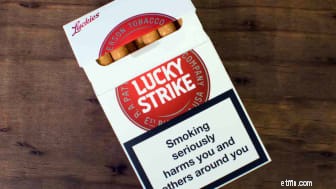
British American Tobacco (BTI, $38.65) holds the No. 2 share of the U.S. tobacco market and is a market leader in 50 countries. The company owned popular brands like Dunhill, Kent, Lucky Strike, Pall Mall and Rothmans and added the Newport, Camel and Natural American Spirit brands through the 2017 acquisition of Reynolds American.
BAT plans to offset declining cigarette volume by growing sales of its vaping, tobacco heating and modern oral tobacco products. The company's Vuse and Vype e-cigarettes are market leaders in the U.S., Canada and Europe. And its Velo and Lyft modern oral tobacco products are rapidly gaining share in Europe and the U.S.
During the first six months of 2020, BAT's adjusted EPS improved 7% as a result of an improved cigarette price/sales mix and an increased contribution from non-combustible tobacco categories, which rose 71% year-over-year. The company's preliminary 2020 results include a 0.4% decline in revenues, but 5.5% gains in adjusted EPS.
At present, the U.S. is the world's largest vaping market (12 million customers) and BAT anticipates the number of U.S. vaping customers will rise to 50 million by 2030. The company expanded its portfolio of modern oral tobacco products last November by acquiring the Dryft Modern Oral business, which will be rebranded with its Velo name.
This European Dividend Aristocrat transitioned from semi-annual to quarterly dividends in 2018 and increased dividend payments 4% in 2020.

UK-based Diageo (DEO, $169.66) is a global alcoholic beverage company making sales in over 180 countries. The company owns popular brands including Crown Royal and Johnny Walker (whisky), Captain Morgan (rum), Smirnoff (vodka), Tanqueray and Gordons (gin), Bailys (liqueur) and Guinness (beer).
Diageo plans to boost profits by expanding the premium content of its portfolio. It has recently entered new super-premium segments via the acquisition of Aviation American Gin, one of the fastest growing gin brands in the U.S. and the Davos brand portfolio, which includes Astral Tequila, Sombra Mezcal and TYKU Sake. In addition, Diageo plans to acquire the Chase Distillery, which produces Chase GB Gin and Chase Original Potato Vodka. U.K. demand for premium gins is growing twice as fast as the overall gin market.
Diageo achieved 1% organic sales growth during the six months ending in December, fueled by a favorable performance from its North American business. Operating profit fell 3% due to a less favorable channel and category mix.
Dividends are paid semi-annually. Diageo hiked 2020 dividends by 2% and announced an interim dividend payable in April 2021 that is 2% higher than last year. It's among a cadre of European Dividend Aristocrats that have provided steady or higher dividends for more than two decades.

Legal &General Group (LGGNF, $4.10) provides insurance products and services to customers in the U.S. and U.K. The company is the U.K. market leader in risk management and one of Europe's largest asset managers with more than £1 trillion of assets under management.
Its U.S. retirement products business has been a growth catalyst in 2020, contributing 40% growth and $1.6 billion worth of pension risk transfer transactions during the year. In addition, the company's U.S. reinsurance volume has been steadily increasing, with over $5 billion in volume written since 2015. The U.S. retirement products business experienced its strongest September quarter ever in 2020 and has plenty of room to run, given an addressable market estimated at $3 trillion.
Full-year operating profits, however, were flat despite growth in three of its five businesses.
Prior to 2020, Legal &General Group had generated 125% growth in operating profits, 131% EPS gains and 175% dividend growth since 2011. Its fastest-growing businesses – retirement solutions and pension risk transfer – have produced better than 20% annual growth.
Although the company plans to hold its 2020 dividend steady, Legal &General Group targets 3% to 6% annual dividend growth in 2021 and beyond.
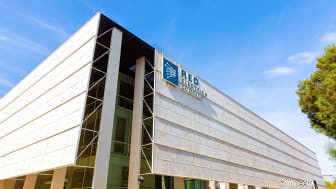
Spanish utility Red Eléctrica (RDEIY, $8.86) operates regulated electricity transmission and telecommunication businesses in Spain and internationally. The company owns nearly all of Spain's power grid, has a growing Latin American infrastructure business and recently expanded its telecom operations by acquiring one of Spain's leading communications satellite operators.
Red Eléctrica stepped up investments in international electricity infrastructure during 2020 via an acquisition in Brazil and development projects in Chile and Peru. In addition, the company is building a telecommunications satellite scheduled to launch in 2022. This satellite will provide coverage of the continental US, North Atlantic corridor and Greenland.
The company's net profits fell 4% on a 1% sales decline during the first nine months of 2020 as a result of reduced demand for electricity during COVID business shutdowns and regulatory adjustments that lowered Red Electricia's billable fees.
Red Eléctrica plans to invest €6.4 billion in electricity transmission infrastructure over the next five years and is seeking approval for its plan from EU authorities. Over 60% of the company's proposed spending is for renewables and international interconnections.
Like many European Dividend Aristocrats, RDEIY's dividends are paid semi-annually. It delivered a final dividend of 78 cents per share in 2020, up nearly 10% from one year earlier, but no interim dividend. An interim dividend of 27 cents was paid in January 2021. Annual dividend growth over five years has averaged approximately 8%.
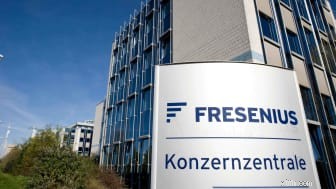
Based in Germany, Fresenius Medical Care (FMS, $37.15) is the world's leading provider of products and services for patients experiencing chronic kidney failure. The company provides dialysis services to nearly 350,000 patients worldwide through its network of 4,000 dialysis clinics. Fresenius is also the market leader in dialysis-related products such as hemodialysis machines and disposables.
Long-term growth drivers for the company's business include an aging global population, increasing incidences of diabetes and high blood pressure, and better-quality treatments. North America represents 70% of the company's revenues.
The company's revenues rose 5% on a constant currency basis during 2020 and adjusted net income improved 12%. Free cash flow surged 120% to €3.2 billion as a result of advanced payments under the CARES Act and other COVID relief and lower U.S. tax payments. Fresenius is guiding for lower 2021 EPS due to COVID effects but sees high single-digit earnings growth through 2025.
Dividend payments are made annually and the company plans to pay a €1.34 dividend in May, up 12% from last year and marking its 23rd consecutive year of dividend growth – good enough to put it among the top half of European Dividend Aristocrats by streak length.

England's Imperial Brands (IMBBY, $20.91) through its subsidiary Imperial Tobacco sells tobacco and e-vaping products worldwide. It is the world's fourth-largest tobacco company thanks to prominent brands that include John Player Special, Winston, Gauloises, Kool, West and Fine cigarettes, Montecristo and Habana cigars, and Blu e-cigarettes. Sales are made in 160 countries with the U.S., Germany, the U.K., Australia and Spain accounting for nearly 75% of operating profits.
The company anticipates its future growth will come from its next generation vaping, heated tobacco and oral nicotine products, which are expected to account for 20% of the nicotine market by 2025.
Imperial Brand's sales were relatively flat in fiscal 2020 ended in September; adjusted EPS declined 6% as a result of lower tobacco profits, increased regulatory costs and losses in the evolving next generation product category. The company sold its premium cigar business last year, used the proceeds to reduce debt, and converted 127% of earnings to cash. Imperial Brands is guiding for low to middle-single digit operating profit growth in 2021.
The European Dividend Aristocrat revised its dividend policy last May to prioritize debt reduction. However, the company has paid dividends continuously since 1997 and is committed to resuming dividend growth in the future. Over the past decade, dividends have grown nearly 6% annually.

Spirax-Sarco Engineering (SPXSF, $163.25) is a U.K. -based manufacturer of industrial and commercial steam systems, electric heating and temperature management solutions and fluid transfer pumps and related technology. The company is a global leader in steam systems and benefits from its resilient business model, which derives roughly 85% of revenues from essential maintenance and repair services for customers.
Revenues declined 4% in 2020, including by 3% on an organic basis. Adjusted basic earnings per share were off by 3% as well.
SPXSF already sells direct in 66 countries and anticipates future growth will come from increasing safety and clean energy regulatory requirements worldwide, geographic expansion, new products and bolt-on acquisitions.
The European Dividend Aristocrat offers an annual payout that improved 10% in 2020 and has risen every year since 1998.

Denmark's Coloplast (CLPBY, $15.05) develops and markets intimate healthcare products and services. It markets ostomy products and accessories under the Sensura and Brava brands, continence care products under the Speedicath, Persisteen and Conveen brands and wound care products under the Biatain brand.
Coloplast holds the leading global market share in ostomy and incontinence care and No. 4 and No. 5 market shares in interventional urology and wound care, respectively. Nearly 60% of Coloplast's sales are made in Europe, 24% are from other developed countries and 17% are from emerging markets.
Despite 2020 challenges due to the cancellation of many elective medical procedures, Coloplast's organic sales grew 4% and EBIT increased 5%. The company also launched its new Strive 25 corporate strategy that aims to increase efficiency via production line automation. This initiative also supports the company's goal of 7% to 8% organic sales growth.
The chronic care markets served by Coloplast provide recurring revenues and stable growth. Coloplast recently entered the $1 billion market for over-active bladder products by acquiring Nine Continents Medical, which is developing an implantable device for treating over-active bladder. This device could seek FDA approval as early as 2024.
Coloplast pays dividends semi-annually and grew payments 6% in 2020.

Swiss healthcare company Novartis (NVS, $86.30) is known for its blockbuster drugs Costentyx (arthritis), Gilenya (neurology) and Entresto (heart failure). Its portfolio includes five blockbuster drugs, each generating more than $1 billion of annual sales. The company has more than 40 new compounds in development and secured FDA approvals to commercialize 26 new treatments during 2020.
Novartis' sales from continuing operations rose 3% in 2020, driven by increased sales of Entresto, Zolgensma and Costentyx, which were partially offset by lower demand for ophthalmology, dermatology and consumer retail products. Net income from continuing operations grew 20% and 2020 free cash flow was 10% lower but still healthy at $11. 7 billion.
Novartis is guiding for low- to mid-single-digit sales growth in 2021 and mid-single digit operating income growth.
The European Dividend Aristocrat increased its dividend 2% in 2020, representing the 24th consecutive year of dividend increases since Novartis' founding in 1996.

Sage Group (SGPYY, $35.14) provides IT solutions to small and medium-sized businesses and serves millions of customers worldwide. This UK-based company offers cloud-based software tools for accounting, financial management, enterprise planning, HR, payroll and payment processing. The company benefits from spending on cloud-based software estimated to grow 11% annually and create a $33 billion addressable market comprised of 69 million small businesses over the next five years.
While Sage Group faces cost challenges recently from customers migrating to the cloud, the company enjoys 90% recurring revenues, excellent free cash flow conversion (123% of earnings) and a resilient balance sheet showing £1.2 billion of cash and investments and a 0.3% ratio of net debt-to-EBITDA.
Sage Group's organic sales rose 4% in 2020 and recurring revenues increased 8%, but operating profit declined 4% due to rising marketing costs. Sage Group targets 3% to 5% growth in recurring revenues in 2021, but lower operating profits due to increased investments in marketing and product development.
Sage Group pays dividends semi-annually. The European Dividend Aristocrat's total payout rose 2% in 2020 and dividends have increased every year since 2005.

Swiss food giant Nestlé (NSRGY, $115.47) is the world's largest food and beverage conglomerate. Its iconic brands include Stouffer's (frozen entries), Purina (pet food), Perrier and Poland Spring (water), Nescafé (coffee), Lean Cuisine (ready-to-eat meals), Haagen-Dazs (ice cream), and Gerber (baby food). Nestle's portfolio includes 34 brands that each generate over CHF 1 billion ($1.12 billion) in annual sales.
The company plans to boost profits by expanding in higher-growth categories such as coffee, pet care, infant nutrition, water and nutritional health. Nestlé also actively manages its portfolio and has acquired or divested more than 50 businesses since 2017. Recent acquisitions include Starbuck's consumer packaged tea and coffee business. Divestitures consisted of Nestle shedding its under-performing USA Confectionery and Gerber life insurance businesses last year.
In 2020, Nestlé's organic sales rose 3.6%, mainly as a result of strong growth in its premium pet food business. Underlying earnings improved by 3.5% on a constant-currency basis.
Nestlé positioned for higher growth in nutritional health products in 2021 by acquiring new collagen products, medical foods and treatments for life-threatening food allergies last year.
Nestlé is one of the oldest dividend payers among the European Dividend Aristocrats; the company has been paying dividends continuously since 1959. Nestlé's dividends grew 10% in 2020 to $2.70 per share.

British Bunzl (BZLFY, $32.79) benefited from robust COVID-related demand for cleaning products in 2020. The company is a leading distributor of cleaning solutions, safety equipment and healthcare consumable products. Its sales of masks, sanitizers, gloves, disinfectants, face shields and related equipment more than doubled last year, and was only partially offset by reduce demand from foodservice customers.
Much of the company's recent growth has come from acquisitions. Bunzl has closed roughly 160 acquisitions since 2004, in the process extending its reach to 31 countries. Transactions from 2020 included the purchase of a Canadian hygiene products company and a Brazilian distributor of protective equipment.
Bunzl's revenues grew by 9.4% on a constant-currency basis in 2020, while adjusted earnings shot 26.6% higher. Meanwhile, it grew the dividend from 51.3 pence to 54.1 pence – a 5.5% improvement. Bunzl has posted 27 consecutive years of dividend increases with annual dividend growth ranging around 10%.

EssilorLuxottica (ESLOY, $80.99) is the world's leading designer and manufacturer of ophthalmic lenses, frames and sunglasses. Headquartered in Paris, the company owns the Ray-Ban, Oakley, Varilux and Transitions eyewear brands and sells direct to consumers through its Sunglass Hut and LensCrafter retail stores. The business was created when lens manufacturer Essilor merged with eyeglass frame maker Luxottica in 2018 and retail stores were added to the mix by purchasing Dutch optical company Grandvision.
Essilor announced a collaboration with Facebook in September to develop Ray-Ban branded "smart" glasses, which will be available in stores beginning in 2021.
COVID-related store shutdowns triggered a 20% decline in Essilor's revenues during the first nine months of 2020, although sales rebounded in the September quarter. E-commerce was a particularly bright spot with September quarter e-commerce revenues up 40% year-to-date.
EssilorLuxottica, which has been among the European Dividend Aristocrats for more than a quarter-century, grew its dividend 35% in 2019 and paid an interim dividend of €1.15 in December 2020. A final dividend has not yet been announced.
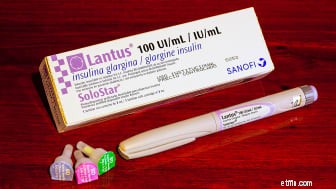
French drug-maker Sanofi (SNY, $49.97) specializes in medicines for diabetes, rare blood disorders, immune disorders, cancer and multiple sclerosis. The company also produces vaccines. Sanofi's blockbuster drugs include Lantus (diabetes), Dupixent (atopic dermatitis), Aubagio (multiple sclerosis) and Lovenox (cardiovascular). While Latus sales are declining due to generic competition, Sanofi is offsetting this decline with newer drugs like Dupixent, which grew revenues 74% in 2020.
The company's sales rose 3% in 2020, driven by Dupixent and influenza vaccine sales. Reported EPS was 338% higher due to capital gains from the company's sale of its stake in Regeneron. On an adjusted basis, EPS improved 4%. Sanofi is guiding for high-single-digit EPS growth in 2021.
In January, the company announced plans to acquire Kymab for a $1.1 billion payment upfront and $350 million of milestone payments. Kymab is developing a novel monoclonal antibody that treats a variety of immune disorders and inflammatory diseases.
The European Dividend Aristocrat paid a €3.20 dividend in 2020, up 2% from the prior year, and delivered its 27th consecutive year of dividend growth.
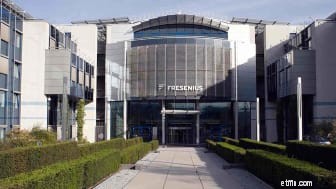
Germany's Fresenius SE (FSNUY, $11.49) is a global leader in healthcare services. The company owns a network of hospitals, a hospital supply business and a project management and construction business serving hospital groups. It also owns a 31% stake in dialysis-services provider Fresenius Medical Care.
Fresenius SE is the largest private hospital operator in Europe based on a network of 89 acute care hospitals, 128 outpatient clinics and six prevention centers that together treat 15.4 million patients annually.
In fiscal 2020, sales improved by 5%, but EBIT (earnings before interest and taxes) were level, and earnings per share declined by 3%.
The company has delivered an impressive 27 consecutive years of dividend growth. Dividends rose 12% in 2020 and growth over five years has exceeded 15% annually.

Dutch IT firm Wolters Kluwer (WTKWY, $89.48) provides professional information and software solutions and services for customers in the healthcare, tax and accounting, corporate governance, legal and regulatory industries. The company sells to customers in 180 countries, and derives roughly 62% of revenues from North America, 30% from Europe and 8% from Asia Pacific.
Recurring revenues represent more than 80% of total revenues and provide Wolters Kluwer with enough flexibility to consistently invest 8% to 10% of sales in product development and pay a rising dividend. The company anticipates future growth will come from extending its product lines and distribution channels and making bolt-on acquisitions that are accretive to EPS.
Reflecting a strong contribution from recurring revenues, Wolters Kluwer's overall sales rose 1% during 2020, adjusted operating profits improved 5% and adjusted free cash flow increased 16% on a constant-currency basis.
The company introduced a COVID-19 Enterprise Solution in 2020, acquired two businesses (XCM Solutions and eOriginal) and divested its ComplyTrack healthcare regulatory risk management tool for an undisclosed amount.
Wolters Kluwer has improved its payout for more than three decades. The company established a progressive dividend policy in 2007 and switched from annual to semi-annual dividends in 2015. Dividends rose 20% in 2019. In 2020, the company paid a €0.47-per-share interim dividend that was 40% less than the prior-year interim dividend. However, a final dividend of €0.89 will result in total payouts of €1.36, up 15% year-over-year.

Ireland's Kerry Group (KRYAY, $131.10) is a leading developer and manufacturer of specialty ingredients used to improve the flavor, appearance and health benefits of packaged foods. The company has manufacturing facilities in 148 sites and sales in more than 150 countries.
Kerry Group is the global market leader in flavorings used in dairy, savory, cereal, beverage and nutritional supplements and also supplies ingredients for five of the world's top 10 blockbuster drugs.
The company's strategies for future growth focus on expanding sales channels and its customer base by entering adjacent markets such as snack foods and food-to-go solutions.
Although COVID negatively impacted the company's first-half 2020 results, the business recovered strongly in the September quarter, generating volume that approached prior year levels. Kerry also acquired a Canadian manufacturer of probiotics and a Chinese supplier of savory flavorings during the September quarter.
Its preliminary expectations for full-year 2020 include a 4.0% decline in revenues, and a 9.4% drop in adjusted EPS.
However, since its 1986 IPO, Kerry Group has generated 10% annual growth in sales, 13% yearly adjusted EPS gains and 17% annual dividend rises. Going forward, Kerry Group targets 10% or higher annual EPS and dividend growth.
The company raised its dividend 10% in 2020, extending its record of payout hikes and continuing its membership in the European Dividend Aristocrats.

Swiss pharmaceutical Roche Holdings (RHHBY, $40.63) is the world's largest biotech company and a leader in in-vitro diagnostics and tissue-based cancer diagnostics. The company owns many of the world's top-selling oncology drugs such as Avastin, Herceptin, Rituxan, Perjeta and Tecentriq.
Roche faces challenges from generic competition for some cancer drugs and aims to offset this impact with newer drugs like Ocrevus (multiple sclerosis), which Roche believes could replace nearly half of the lost cancer sales.
Roche introduced four new medicines in 2020 and has 19 new compounds in late-stage development. The company began a major player in the COVID-19 space during 2020 by launching 15 coronavirus diagnostic products and developing four different medicines for treating COVID-19 infections currently in clinical trials.
Roche's sales grew 1% in 2020 as a result of robust sales of COVID diagnostics, which more than offsetting lower pharmaceutical sales attributable to generic competition. Core EPS rose 4% and Roche is guiding for low to mid-single digit revenue and EPS growth and a rising dividend in 2021.
Roche increased its dividend 3% in 2020, extending its record to 18 consecutive years of payout hikes. All told, it has delivered more than three decades of dividend stability or growth.

French firm L'Oreal (LRLCY, $78.69) is a world leader in skin care, hair care and cosmetics. Its iconic brand portfolio includes the Lancôme Paris, Garnier and Maybelline brands. The company has the No. 1 global share in the cosmetics market, offering 36 different personal care brands across 150 countries. Its products are sold in hair salons, drug stores, big box stores and via the Internet.
Because of its strong brands, L'Oreal was able to outperform the overall beauty market in 2020. The company anticipates a return to growth in 2021, fueled by product launches, maximizing its digital presence and e-commerce channels and expanding its presence in China.
L'Oreal has grown dividends 8% annually over the past 10 years. Shareholders who have owned the stock more than two years also qualify for a 10% loyalty bonus dividend.

U.K.-based Halma (HLMAF, $33.20) provides technologies for the safety, health and environmental markets. Its product line includes instruments for detecting gas leaks, explosions and corrosion and fire detection and suppression systems. Halma derives the majority of its sales in the U.S. and Europe.
The company has generated 17 consecutive years of rising sales and profits, driven by new products and niche acquisitions. Over this period, revenues have risen 10% annually and profits have increased at an 11% annual rate. However, COVID business slowdowns have impacted 2020-21 results; Halma's sales and profits were each down 5% during the first six months of 2020-21.
Halma is the longest-tenured of the European Dividend Aristocrats at more than four decades of payout growth. The company raised its dividend 5% in 2020, extending its consistent record of 5% or higher annual dividend hikes. Analysts look for Halma to deliver 11% adjusted EPS growth and 5% dividend growth in 2020-21.